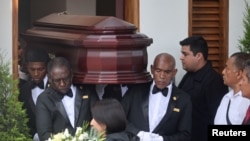The Peruvian government declared three days of national mourning on Thursday for the death of former President Alberto Fujimori, who died on Wednesday of cancer, while the wake is being held at the Ministry of Culture, where authorities and supporters have arrived.
“The Executive Branch declared National Mourning on September 12, 13 and 14, 2024… Likewise, it has been arranged that the former president’s funeral will receive the funeral honors corresponding to a sitting president,” states an article in the official gazette “El Peruano.”
The former president, who governed Peru between 1990 and 2000, had been suffering from tongue cancer for several years and had recently undergone surgery for a hip fracture following a fall. He died in his daughter’s homeKeiko Fujimori, at 86 years of age.
His family has arranged for his wake to be open to the public until Saturday, when he will be buried in a cemetery on the outskirts of Lima.
At noon on Thursday, President Dina Boluarte came to offer her condolences, along with other members of her cabinet, approached the former president’s coffin and spoke with his children.
Boluarte, who has an 80% rejection rate according to polls, has survived seven attempts to remove him from office thanks to the protection of a coalition of political groups in Parliament, including the Fujimorist party.
Hours earlier, several supporters had arrived at Keiko Fujimori’s house praising the government of her father, a controversial political figure who generates love-hate reactions among Peruvians. He served a 25-year sentence for two massacres during his government, which was cut short after receiving a humanitarian pardon.
César Aquije, 55, was carrying a sign he made himself that had “gratitude, engineer Alberto Fujimori” written on it along with a drawing of a red and white heart, he reported. APThe businessman said he was at the barber shop when he heard the news and did not hesitate to tell his wife that, even though it was already night, it was necessary to go to the former president’s house.
“I remember the schools he built and the roads,” said Aquije, who was born in the Ica region south of Lima.
But others criticized Boluarte’s government and Fujimori’s legacy. “Fujimori dies, convicted of human rights violations and corruption, and a murderous government like the one in the 90s pays tribute to him,” said Gisela Ortiz, sister of one of the 25 Peruvians killed by a group of soldiers during Fujimori’s government, on X, formerly Twitter.
“Official messages of regret when there is impunity for their crimes. Your memory remains, my brother, and all the love for which we continue to fight,” said Ortiz.
Human rights associations organized demonstrations against the former president.
His eldest daughter Keiko, 49, and his youngest, Kenji, 44, who in recent years have been involved in a bitter political dispute that led to the younger being convicted of corruption, were at the forefront of the wake, sometimes holding hands and both dressed in black.
In addition to his conviction as an indirect perpetrator of the murder, the former president also received three other convictions for corruption, including one for paying $15 million using public funds to his former spy chief Vladimiro Montesinos near the end of his administration in 2000.
The former president did not repent for his crimes nor pay civil reparations. While free, he reactivated his social networks and claimed that his government defended the people and fought the terrorist group Shining Path.
Fujimori, 86, was declared dead at around 6 p.m. Wednesday, his oncologist Jose Gutierrez told reporters. He said he had tongue cancer that had spread to his lungs after he underwent surgery in July for a hip fracture caused by a fall from his bed while sleeping. He had been unconscious since Tuesday from the effects of his treatment.
In December, the former president left prison after the Constitutional Court reinstated a pardon for his poor health conditions granted in 2017 by then-President Pedro Pablo Kuczynski (2016-2018) and Boluarte’s government complied with the release. He left 10 years before the end of his 25-year sentence.
[Con información de AP]
Connect with the Voice of America! Subscribe to our channels YouTube, WhatsApp and to newsletter. Turn on notifications and follow us on Facebook, X and Instagram.







![[Img #74784]](https://thelatestnews.world/wp-content/uploads/2025/01/Suffering-abuse-in-childhood-progressively-increases-the-risk-of-suffering-150x150.jpg)








Add Comment